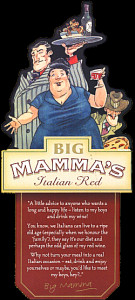Too much information?
February 12th, 2013 | Labels
At the beginning of this month a UK government health minister revealed that in future wine labels might be required to include yet more information, this time relating to calorie content. Wine labels are already crammed with consumer advice, and this is made even more complicated by the fact that each country has its own regulations.
This latest idea suggests that wine consumers are becoming overweight and obese owing to excessive alcohol consumption, although I would have thought that this problem is perhaps more related to beer than it is to wine. Having said that it is perhaps true to say that alcohol can be underestimated when it come to calories, one pint of lager beer for example can contain 250 calories, whilst one single glass of wine might be anything from 140 up to 230 calories (depending on the wine style).
Perhaps I am biased but I still believe that wine is sometimes unfairly blamed for specific health problems. For example, binge drinking is rarely associated with wine, liver disease is more often caused by spirits, and I am still of the opinion that weight problems are probably more related to beer drinking. Of course, wine is not completely blameless, but it does often get dragged into the argument.
The calorie count in wine comes from the sugar and alcohol, but there is no hard and fast rule as to which type of wine contains the most carbohydrates – it is perfectly possible to find a slightly sweet, low alcohol wine that has less calories than a dry, high alcohol wine. Perhaps surprisingly, it’s not all about sugar, indeed there are more calories in the alcohol itself which is why it is so difficult to provide a standard calculation.
The good news is that besides the carbs and calories, there are also nutrients in wine that come from the skin of the grape itself. Generally speaking red wine contains more minerals and antioxidants than white wine, but any colour of wine, in moderation, is not bad for you!
At the beginning of this month a UK government health minister revealed that in future wine labels might be required to include yet more information, this time relating to calorie content. Wine labels are already crammed with consumer advice, and this is made even more complicated by the fact that each country has its own regulations.
This latest idea suggests that wine consumers are becoming overweight and obese owing to excessive alcohol consumption, although I would have thought that this problem is perhaps more related to beer than it is to wine. Having said that it is perhaps true to say that alcohol can be underestimated when it come to calories, one pint of lager beer for example can contain 250 calories, whilst one single glass of wine might be anything from 140 up to 230 calories (depending on the wine style).
Perhaps I am biased but I still believe that wine is sometimes unfairly blamed for specific health problems. For example, binge drinking is rarely associated with wine, liver disease is more often caused by spirits, and I am still of the opinion that weight problems are probably more related to beer drinking. Of course, wine is not completely blameless, but it does often get dragged into the argument.
The calorie count in wine comes from the sugar and alcohol, but there is no hard and fast rule as to which type of wine contains the most carbohydrates – it is perfectly possible to find a slightly sweet, low alcohol wine that has less calories than a dry, high alcohol wine. Perhaps surprisingly, it’s not all about sugar, indeed there are more calories in the alcohol itself which is why it is so difficult to provide a standard calculation.
The good news is that besides the carbs and calories, there are also nutrients in wine that come from the skin of the grape itself. Generally speaking red wine contains more minerals and antioxidants than white wine, but any colour of wine, in moderation, is not bad for you!




